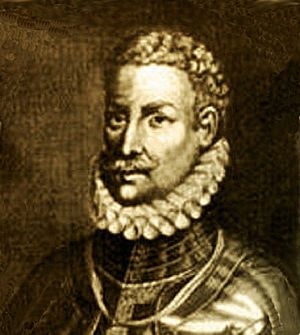Francisco de Aldana facts for kids
Francisco de Aldana (born in the Kingdom of Naples in 1537, died in Ksar el-Kebir, Morocco, on August 4, 1578) was a military officer and one of the most important poets in the Spanish language during the 16th century. He was a key figure in the second part of the Spanish Renaissance.
Contents
Early Life and Education
Historians have debated where Francisco de Aldana was born for a long time. It is now believed he was most likely born in the Kingdom of Naples. His father, Antonio de Aldana, was also a military man.
Francisco spent his younger years in Florence, Italy. There, he studied ancient languages and learned a lot about classical writers. He was also influenced by Italian poets like Vittoria Colonna.
A Poet's Life and Works
Francisco de Aldana was known as "the Divine" because his poetry was so highly praised. He was a follower of Neoplatonism in his writing. This was a philosophy that explored ideas about beauty, love, and the soul's journey to God.
His brother, Cosme, collected and published his poems after Francisco's death. These were released in two parts, in 1589 and 1591. Among his most famous works are his sonnets. In these poems, he often shared his feelings of disappointment with military life. He also wrote about his strong wish to live a quiet life, alone in nature.
One of his important works is a poem called Fable of Phaeton. He also wrote the unique Song of Christ crucified. Another famous piece is the Epistle to Arias Montano on the contemplation of God (written in 1577). This poem uses a special rhyming style called chained tercets. It shows his Neoplatonic ideas and is considered a classic in Spanish poetry.
Here is a small part of his famous Epistle:
-
-
-
-
-
-
-
-
-
- Pienso torcer de la común carrera
- que sigue el vulgo y caminar derecho
- jornada de mi patria verdadera;
-
-
-
-
-
-
-
-
-
-
-
-
-
-
-
-
-
- entrarme en el secreto de mi pecho
- y platicar en él mi interior hombre,
- dó va, dó está, si vive, o qué se ha hecho.
-
-
-
-
-
-
-
-
-
-
-
-
-
-
-
-
-
- Y porque vano error más no me asombre,
- en algún alto y solitario nido
- pienso enterrar mi ser, mi vida y nombre
-
-
-
-
-
-
-
-
-
-
-
-
-
-
-
-
-
- y, como si no hubiera acá nacido,
- estarme allá, cual Eco, replicando
- al dulce son de Dios, del alma oído.
-
-
-
-
-
-
-
-
Many famous writers admired Aldana's work. Francisco de Quevedo tried to publish his poems in the 16th century. Miguel de Cervantes mentioned him alongside other great poets like Boscán and Garcilaso. In the 20th century, poets from the Generation of 1927, such as Luis Cernuda, also loved his writing.
Military Service
Francisco de Aldana had a military career, but he soon grew to dislike it. He often wished for a more peaceful, thoughtful life. He fought as a captain in the Battle of St. Quentin. Later, he served as a general of artillery in the Tercios of Flanders. He was under the command of Fernando Álvarez de Toledo y Pimentel, the Duke of Alba. During the Siege of Haarlem, he was wounded in the foot by a gunshot.
He also spent time at the court of the Medici family in Florence. This is where he finished his education and training. King Philip II of Castile sent him to serve King Sebastian I of Portugal. Francisco de Aldana died fighting alongside King Sebastian in the Battle of Kasr al-Kabir. He had strongly advised the king not to go on that military trip.
Notable Works
Sonnets
- Al cielo
- Alma Venus gentil, que al tierno arquero
- ¿Cuál es la causa, mi Damón, que estando
- Cuál nunca osó mortal tan alto el vuelo
- El ímpetu cruel de mi destino
- Es tanto el bien que derramó en mi seno
- Galanio, tú sabrás que esotro día
- Hase movido, dama, una pasión
- Mil veces callo que romper deseo
- Mil veces digo, entre los brazos puesto
- Otro aquí no se ve que, frente a frente
- Por un bofetón dado a una dama
- Reconocimiento de la vanidad del mundo
Other Poems
- Carta para Arias Montano (also known as the Epístola a Arias Montano)
- Pocos tercetos escritos a un amigo
See also
 In Spanish: Francisco de Aldana para niños
In Spanish: Francisco de Aldana para niños
 | Charles R. Drew |
 | Benjamin Banneker |
 | Jane C. Wright |
 | Roger Arliner Young |


